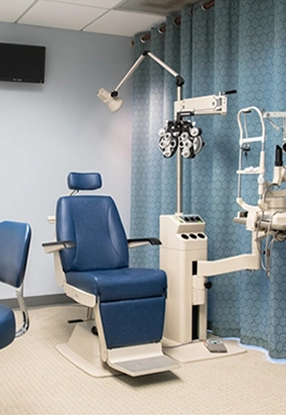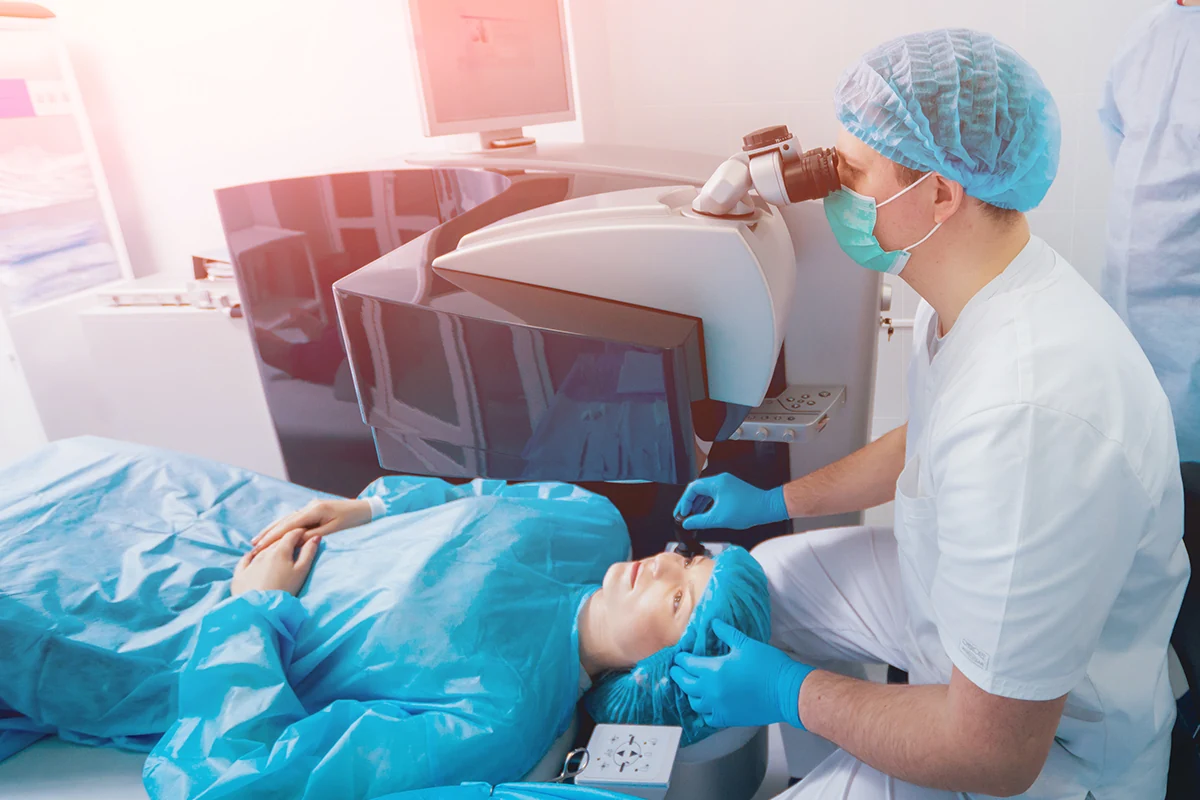PRK Surgery

At Diagnostic Eye Center in Houston, we know that each patient has unique vision correction needs and goals—that is why we offer a range of customizable treatment options. LASIK is the most well-known vision correction surgery, but it is not right for everyone. PRK vision correction surgery is a LASIK alternative that may be an option for patients who are not candidates for LASIK.
What is PRK Eye Surgery?
PRK, which stands for photorefractive keratectomy, is a laser vision correction surgery that treats refractive errors including myopia (nearsightedness), hyperopia (farsightedness) and astigmatism. According to the American Academy of Ophthalmology, PRK surgery can
Trusted Source
What is Photorefractive Keratectomy (PRK)?
American Academy of Ophthalmology
Go to Source
reduce
or even eliminate the need for glasses or contact lenses.
Comparing Eye Surgeries: PRK Vs. LASIK
PRK shares many similarities with LASIK. Both types of refractive surgery correct vision by reshaping the cornea. Ophthalmologists use the same type of laser, called an excimer laser, in both procedures. The primary difference between PRK and LASIK is the way in which the surgeon accesses the cornea. In a LASIK procedure, the surgeon makes an incision to create a corneal flap. In a PRK procedure, the surgeon uses an alcohol solution to remove the epithelium, which is the outermost layer of the cornea.
People who are not candidates for LASIK due to irregular or thin corneas may be able to have PRK because of the difference in the way the cornea is treated. PRK does require a bit more downtime during recovery than LASIK, but studies show that the long-term patient satisfaction rate is similar to
Trusted Source
A Comparison of Visual Outcomes and Patient Satisfaction Between Photorefractive Keratectomy and Femtosecond Laser-Assisted In Situ Keratomileusis
Hashmani N, Hashmani S, Ramesh P, et al
Go to Source
LASIK.

“I am very pleased with my experience at Diagnostic Eye Center. The entire process for my PRK went smoothly, and staff was courteous and professional. Dr. Salem was great! He answered all my questions without feeling rushed, and he explained every step of the procedure before and during my PRK.”

What to Expect From PRK Surgery
Preparing for PRK
The first step is a consultation with one of our eye doctors. During this appointment you will have the opportunity to learn more about your options and ask any questions. After your eye exam, if you and your eye doctor decide that PRK is right for you then you will receive detailed preoperative guidelines.


The PRK Procedure
PRK is an outpatient procedure. Your eyes will be numbed with anesthetic eye drops and you may be offered sedative medication to help you relax. The eye doctor will use a special alcohol solution to remove the epithelium. Then they will use the excimer laser to precisely reshape your cornea in order to improve your vision. A temporary contact lens will be placed on the eye to act as a bandage during the healing process. You will need a friend or family member to drive you home after surgery.
PRK Recovery and Results
After PRK surgery, the corneal epithelium will regenerate during recovery, which is why PRK patients need a little more recovery time than LASIK patients. You can expect to take about 5 days off of work or school after PRK.
Frequently Asked Questions About PRK
Good candidates for PRK are over 18 with healthy eyes and a stable vision prescription. The best way to find out if PRK is right for you is to schedule a consultation.
Any medical procedure carries some risk of side effects or complications. PRK is generally a low-risk procedure and many of the most common side effects, such as discomfort or
Trusted Source
Main Complications of Photorefractive Keratectomy and their Management
Spadea L, Giovannetti F
Go to Source
dry eyes
, are temporary. More serious complications can include infection or over- or under-correction of vision.
You need to stop wearing contact lenses prior to your PRK exam and your PRK surgery. This is important because contact lenses distort the shape of your cornea, which interferes with our ability to accurately measure and correct your vision.
Pricing can vary depending on your needs, but we are committed to honest and fair pricing. During your consultation we will review pricing, which includes all pre- and post operative care. We also offer affordable financing options to help you fit better vision into your budget.
1 American Academy of Ophthalmology. What is Photorefractive Keratectomy (PRK)?. Available: https://www.aao.org/eye-health/treatments/photorefractive-keratectomy-prk. Accessed November 22, 2022.
2 Hashmani N, Hashmani S, Ramesh P, et al. A Comparison of Visual Outcomes and Patient Satisfaction Between Photorefractive Keratectomy and Femtosecond Laser-Assisted In Situ Keratomileusis. Cureus. 2017;9(9):e1641. Published 2017 Sep 1. doi:10.7759/cureus.1641. Available: https://www.ncbi.nlm.nih.gov/pmc/articles/PMC5665689/.
3 Spadea L, Giovannetti F. Main Complications of Photorefractive Keratectomy and their Management. Clin Ophthalmol. 2019;13:2305-2315. Published 2019 Nov 27. doi:10.2147/OPTH.S233125. Available: https://www.ncbi.nlm.nih.gov/pmc/articles/PMC6885542
The doctors at Diagnostic Eye Center have reviewed and approved this content.

